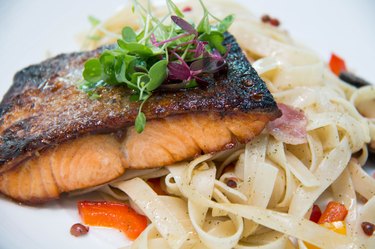
Gastroesophageal reflux disease, or GERD, is a condition in which acid and stomach contents regularly back up into the esophagus, causing symptoms like heartburn. Obesity increases the risk of developing GERD, and people who have obesity are advised to lose weight to decrease the symptoms. For those who are underweight, having GERD can make gaining weight a challenge. A person may have underweight for a variety of reasons, such as having recently recovered from surgery or a genetic predisposition to thinness. Or you may be an older adult who has unintentionally lost weight for nutritional or medical reasons. Understanding a variety of lifestyle and dietary modifications may help when trying to gain weight with GERD.
Don't Eliminate All Potential Triggers
Video of the Day
To gain weight, a person may increase his overall daily intake of calories by eating foods higher in fat and calories. For people with GERD, certain foods and substances, such as spicy foods, fatty foods, chocolate, alcohol and caffeine, may worsen reflux by relaxing the ring of muscle that separates the stomach from the esophagus. While removing these foods from the diet may ease discomfort for some, they do not affect all people the same way, so universal elimination of foods is not recommended, according to the March 2013 "American Journal of Gastroenterology." For the person trying to gain weight with GERD, if such specific foods do not trigger heartburn or other symptoms, the high-calorie foods do not need to be eliminated.
Video of the Day
Eat Smaller, Higher-Calorie Meals
GERD symptoms can be triggered by eating a large amount of food at a single sitting. Eating 6 to 8 smaller meals per day may reduce heartburn and other symptoms. When trying to gain weight with GERD, choose foods that are high in nutrient quality, high in calories and also easy to digest. These choices can be made with the guidance of a dietitian. Drinking fluids between meals, such as water, will also leave room to consume more calories at mealtime.
Stop Smoking
If a person is trying to gain weight, has GERD and smokes, kicking the tobacco habit can help with both problems and produce many other health benefits. Smoking is known to relax the band of muscle between the esophagus and stomach, leading to acid reflux and heartburn. Smoking also makes it more difficult to gain weight, since it increases the number of calories your body burns in 24 hours by as much as 10 percent, according to the July 2011 "Clinical Pharmacology and Therapeutics." So stopping smoking will not only help keep GERD symptoms under control, but it can aid in weight gain. One study, published in the January 2011 issue of "Addiction," found that people who stopped smoking for 8 years gained weight, in particular those who were underweight at the beginning of the study.
Warnings and Precautions
If you have concerns about your weight or about GERD symptoms, it's important to see a healthcare provider. When trying to gain weight, a registered dietitian can assess your current diet and make recommendations on how to gain or maintain weight in a healthy way.
- National Institute of Diabetes and Digestive Kidney Disorders: Eating, Diet, and Nutrition for (GER) and (GERD)
- American Journal of Gastroenterology: Guidelines for the Diagnosis and Management of Gastroesophageal Reflux Disease
- Clinical Pharmacology and Therapeutics: Cigarette Smoking, Nicotine, and Body Weight
- Addiction: Associations Between Weight Change Over 8 Years and Baseline Body Mass Index in a Cohort of Continuing and Quitting Smokers
- American College of Gastroenterology: Do You Have GERD?
- Academy of Nutrition and Dietetics: What You Need to Know About GERD
- University of Illinois at Urbana-Champaign McKinley Health Center: The GERD Diet
Is this an emergency? If you are experiencing serious medical symptoms, please see the National Library of Medicine’s list of signs you need emergency medical attention or call 911.